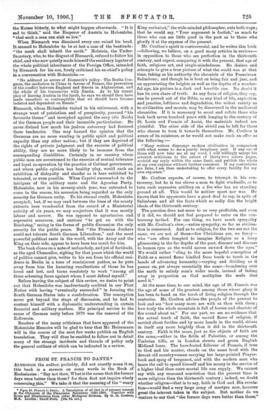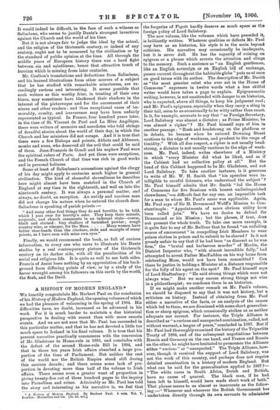FROM ST. FRANCIS TO DANTE.*
ALTHOUGH the author, probably, did not exactly mean it so, this book is a sermon on some words in the Book of Ecclesiastes: "Say not thou, What is the cause that the former days were better than these ? for thou &et not inquire wisely concerning thin" We take it that the meaning of the "weary • From St. Francis to Dante. A Translation of all that is of primary interest In the Chronicle of the Franciscan Balimbene (l221-1288). Together with Notes and Illustrations from other Mediaeval Sources. By G. G. Coulton. NA. London; David Nutt. [10e. 6d. net.] King ecclesia.st," the wide-minded philosopher, cuts both ways; that he would say, "Your argument is foolish," as much to
those who can see little good in the past as to those who glorify it at the expense of the present.
Mr. Coulton's spirit is controversial, and he writes this book —following, we believe, on a good many articles in reviews—
in opposition to those who see perfection in the thirteenth century, and regret, comparing it with the present, that age of faith, religious art, and single-mindedness. He desires and attempts to give a true picture of what the world was at that time, taking as his authority the chronicle of the Franciscan
Salimbene ; and though he is bent on being fair and just, and on appreciating the heights as well as the depths of a wonder- ful age, his picture is a dark and horrible one. No doubt it has its own share of truth. As any form of religion, they say,
can be proved out of the Bible, so any kind of life, aspiration and practice, loftiness and degradation, the widest variety as to civilisation and morals, may be discovered in the mediaeval chronicles. If it is necessary to scout and refute those who look back seven hundred years with longing to the century of St. Louis and Francis of Assisi, the materials indeed are plentiful. The other side of the shield can be left for those who choose to turn it towards themselves. Mr. Coulton is aware of its existence, or he would not make such an offer as the following :—
"Many writers disparage modern civilization in comparison with what seems to me a purely imaginary past. If any one of these will now take me at my word, I will willingly accept his severest criticisms to the extent of thirty-two octavo pages, restrict my reply within the same limit, and publish the whole at my own expense without further comment. If my contentions are false, I am thus undertaking to offer every facility for my own exposure."
Mr. Coulton expects, of course, to triumph in his con- troversy, but he is too clever a man to fight windmills, or to
turn such expensive artillery on a foe who has no standing ground at all. This would be neither sport nor war. He knows that his opponents have a good deal to say, in spite of Salimbene and all the facts which so sadly dim the bright ideals of the thirteenth century.
The question does not seem to us very profitable, and even if it did, we should not feel prepared to enter on the con-
troversy invited. For one thing, we have much sympathy with Mr. Coulton's view,—entire sympathy, so far as civilisa- tion is concerned. And as to religion, for the two are not the same, we are not of those—few Christians are, we fancy— who "are often tempted to imagine Religion as a lamp glimmering in the far depths of the past, dimmer and dimmer to human eyes as the world moves onward down the ages." We would rather "cling to the more hopeful conception of
Faith as a sacred flame kindled from torch to torch in the hands of advancing humanity—varying and dividing as it passes on, yet always essentially the same—broadening over the earth to satisfy man's wider needs, instead of fading away in proportion as God multiplies the souls that need it."
At the same time, to our mind, the age of St. Francis was the age of some of the greatest among those whose glory it has been to hand on the torch of living religion through the centuries. Mr. Coulton advises the people of the present to look and see "how many more are with us than with them ; how truly the whole mountain is full of horses and chariots of
fire round about us." For our part, we see no evidence that the actual torch of faith, the sacred flame of religion, if carried about further and by more hands in the world, shines in itself any more brightly than it did in the thirteenth century. Faith is the same, just as the objects of faith are the same,—either in the fields of Palestine, or among the Umbrian bills, or in London streets and green English Midland lanes. The bare-footed follower of Francis, if true to God and his master, stands on the same level with the devout old countrywoman carrying her large-printed Prayer- book and sprig of bergamot, and with the modern man who hears the call to spend himself and his money in the service of a higher ideal than mere mortal life can supply. We cannot say with any reasoned conviction that the present time is more religious than the thirteenth century ; indeed, we doubt whether religion—that is to say, faith in God and His revela- tion—would find a very large army of martyrs now, however great the interest taken in the subject. But neither do we venture to say that "the former days were better than these." It would indeed be difficult, in the face of such a witness as Salimbene, who seems to justify Dante's strongest invectives against the Church and the world of his time.
But it is not always fair to judge the ideal by the actual, and the religion of the thirteenth century, or indeed of any century, ought not to be measured by the civilisation or by the standard of public opinion at the time. All through the middle years of European history there was a hard fight between, sin and saintliness; hence that attractive touch of heroism which is missing from later centuries.
Mr. Coulton's translations and deductions from Salimbene,
and his learned illustrations from other sources of a subject that he has studied with remarkable minuteness, are ex-
ceedingly curious and interesting. It seems possible that such writers as this worthy friar, in treating of their own times, may sometimes have blackened their shadows in the interest of the picturesque and for the amusement of their nieces and other readers : and thus exceptional cases of im- morality, cruelty, and irreverence may have been unfairly represented as typical. In France, four hundred years later, in the time of St. Vincent de Paul and La Mere Angelique, there were writers of memoirs and anecdotes who told strings of dreadful stories about the world of their day, in which the Church and her ministers did not escape. And it is true that there were a few Bishops and priests, Abbots and Abbesses, monks and nuns, who deserved all the evil that could be said of them. Jean-Francois de Gondi and his nephew Paul were the spiritual rulers of Paris. And yet these were exceptions, and the French Church of that time was rich in good works and in personal holiness.
Some at least of Salimbene's accusations against the clergy of his day might apply to centuries much higher in general civilisation. The kind of shameful slovenliness be describes here might almost have been matched in the Church of England at any time in the eighteenth, and well on into the nineteenth century. It was always a personal matter, and always, no doubt, an exception. An untidy and careless man did not change his nature when be entered the church door.
Salimbene is speaking of parish priests :—
"And many other foul things they do and horrible to be told, which I pass over for brevity's sake. They keep their missals, corporals, and church ornaments in an indecent state—coarse, black and stained : tiny chalices of tarnished pewter ; rough
country wine, or vinegar, for the Mass Many women have better shoe-bands than the cincture, stole and maniple of many priests, as I have seen with mine own eyes."
Finally, we would recommend the book, as full of curious information, to every one who cares to illustrate his Dante studies by a real contemporary picture of the thirteenth century on its darker side, with all the peculiarities of its social and religious life. It is quite as well to see both sides.
Francis of Assisi loses nothing by an appreciation of his back- ground from differing points of view, or by a study of the havoc wrought among his followers on this earth by the world, the flesh, and the Devil.















































 Previous page
Previous page